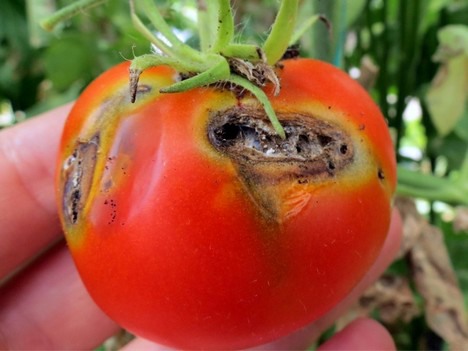In 2006, the tomato leafminer, a plague that affects the tomato plant and causes large losses throughout the value chain, arrived in Spain. This mining lepidopteran mainly attacks the leaves of the plant to feed on the parenchyma, a tissue involved in a wide variety of physiological functions, although it can also penetrate the fruits and cause damage that would render the fruit unmarketable.
In extreme cases, it can also attack shoots that compromise plant growth. The plague has caused losses of between 19% and 35% between the years 2018 and 2020, according to data from the Conca de la Tordera cooperative. In addition to these losses, one must also take into account product returns by customers, including large surfaces, when they see the damage that had not been detected during handling.

The tomato leafminer is one of the most important phytosanitary problems of tomato cultivation worldwide. To address this issue, an operational group coordinated by the Institute of Agri-Food Research and Technology (IRTA) has been set up to promote biological control of the pest and reduce dependence on insecticides. Biological control is a widely used strategy in tomato farming to deal with pests, and it is considered one of the best tools to achieve effective pest control and reduce the environmental impact of agriculture, in line with the ecological transition required by the European Green Deal.
The operational group will work with the Dolichogenidea gelechiidivoris parasitoid, a natural enemy of the tomato leafminer. The larval stage of this parasitoid develops by feeding on the body of a host, in this case, the tomato leafminer, causing it to die. The project will study both the management of parasitoid populations and the scaling of breeding, carrying out release tests in commercial fields in the Maresme production area. The farmers of the cooperatives and the technicians of the Plant Defense Groups (ADV) that participate in the pilot project have been pioneers in the use of natural enemies for the biological control of pests in horticultural crops and, more specifically, in tomatoes.
The project will be carried out thanks to the collaboration of four farmers' cooperatives of the Maresme: Conca de la Tordera, Progrés-Garí, Agrícola Vilassar de Mar, and Cabrera de Mar. IRTA will be in charge of the coordination of the operational group, the leading entity of the project will be the Conca de la Tordera Cooperative and the rest of the cooperatives will follow up and support the execution of the tests. They will lend their farms to carry out pilot tests and will disseminate and transfer the results of the project. The Selmar Federation and the ADV of the Baix Maresme will prepare the work protocols, make critical reviews of the reports and deliverables, plan and monitor the breeding activities, and disseminate and transfer the results of the project.
For more information:
Marina Campos Franco
Técnica de Comunicación IRTA
Tel.: +34 93 467 40 40 (Ext. 1326)
Mob.: +34 674 050 305
marina.campos@irta.cat
